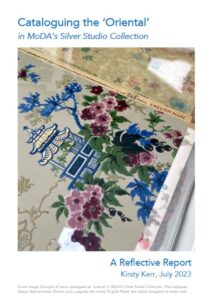Cataloguing the ‘Oriental’ in MoDA’s Silver Studio Collection 3: Rethinking Cataloguing
In this post, MoDA's Collections Manager Sian Woodward reflects on recent work by Masters student Kirsty Kerr as part of the New Museum School Advanced Programme run by Culture& and Museum Studies at Leicester University
We were delighted to host student Kirsty Kerr from Leicester University who was on a placement at the Museum of Domestic Design and Architecture for one day a week between April and June this year.
Kirsty is part of the New Museum School Advanced Programme run by Culture& and Museum Studies at Leicester University, aimed at nurturing a more diverse workforce for the museum sector. Various initiatives have been implemented over the years to try to attract people from different backgrounds. There is recognition that sector-wide change will only come when museums employ a wider range of people, and through that a more diverse range of voices and interpretations of heritage will be heard.
We asked Kirsty to look at the use of the word “Oriental” as a descriptive term in MoDA’s Silver Studio Collection. Silver Studio designers of wallpapers and textiles used it to describe a loosely-defined set of visual characteristics that vaguely meant “Eastern” motifs.
In this third post, Collections Manager Sian Woodward reflects on the questions and recommendations raised by Kirsty’s report in the context of the wider sector rethinking approaches to cataloguing
Kirsty’s project and report come as the wider museum sector is rethinking cataloguing. It was the theme of the Collections Trust Conference of 2022, which asked a series of questions. What is meant by rethinking cataloguing? Is material change happening in cataloguing practice? What implications and impacts are emerging? You can check out the highlights on their YouTube channel
Kirsty’s time working with staff at MoDA and her reflections in her report highlight the importance of stepping back to consider collections and the work of cataloguing.
Museums reflect the people who make the museum, so it is as important to understand the history of the institution and those who have done the work as it is the subjects of the museum and its collections.
Then there is the need to question. Should the museum continue as it has done in the past? Perhaps the people who ‘make’ the museum and do the work need to be more diverse or open to diverse views and perspectives? Maybe the way the work is done needs to change? Once the questioning has started, it becomes much easier. The challenge is, how to answer the questions and change what needs to be changed? Kirsty has made some recommendations that give MoDA ways to start address the complex issues around the use of the term ‘Oriental’.
The work MoDA needs to do has been facilitated by involvement in a specific project. As a project, staff have been able to set aside time to enable this initial exploration and recommendations. MoDA staff recognise that part of amplifying new voices and empowering people to speak for themselves will come through reviewing and critically re-evaluating the words that museums use in their catalogues. It will also come by increasing our own cultural knowledge, widening our own perspectives through paying attention to other voices and perspectives.
But this work needs to be core museum work. While those working in the museum may recognise the effort required, and want to undertake the work, there can be difficulties. The changes need to be real, and sustainable, and not performative. They need to go beyond the life of a single project. How do we ensure the work continues unless it becomes a priority to funders, to those who measure the value and worth of museums, to trustees and parent bodies?
Deep contextual and reflective collections cataloguing has often been overlooked in project funding and goal setting in favour of a push to digitise collections images and information at scale, a more obvious ‘public outcome’ seen to increase access.
Many may fear even beginning such work in case they get any aspect of it ‘wrong’. So it needs to be OK to try and fail, to experiment and admit shortcomings, to seek out others engaged in similar work for mutual advice and encouragement.
At this year’s Collections Trust Conference, titled ‘It’s Good to Share’ the focus is on the transformative benefits for museums, different users, and the wider sector of sharing collections data. Given the limited resources of many museums, sharing experiences around rethinking cataloguing will be just as valuable as sharing the data itself. In both cases, it would help address gaps in knowledge, bring together different perspectives and approaches, and open up opportunities for collaboration. MoDA staff hope that Kirsty’s report can be a resource that is used beyond MoDA; that we can all build on each other’s efforts to encourage ethical engagement in cataloguing as a key practice.
Please read and share Kirsty’s full report and recommendations here: Kerr, Kirsty (2023). Cataloguing the ‘Oriental’ in MoDA’s Silver Studio Collection. Middlesex University. Preprint. https://doi.org/10.22023/mdx.24081330.v1
For more on the case for contextual and reflective , or ‘slow’, cataloguing, see Making the case for slow cataloguing by Dr Anjalie Dalal-Clayton and Ananda Rutherford, keynote at the 2022 Collections Trust conference
Don’t miss the first and second posts in this series!
